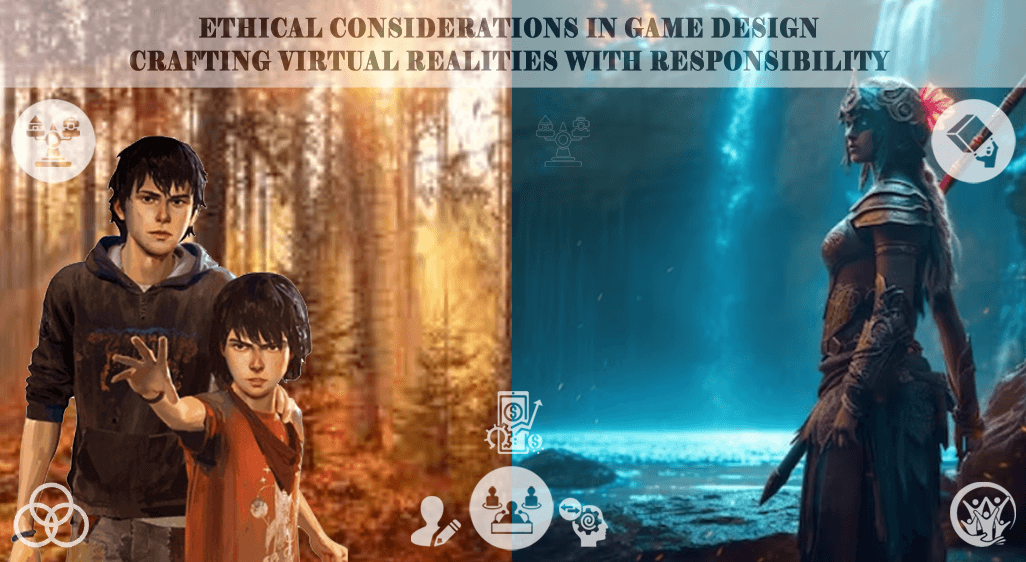Video games have indisputable potential as a medium for entertainment, education, and social interaction in a world where digital landscapes have seamlessly woven themselves into our daily lives. It is necessary to think critically about the ethical issues that drive the development of these immersive virtual realities, though, as game designers continue to push the envelope of innovation. Beyond the use of pixels and polygons, game designers have a duty to consider concerns of inclusion, diversity, and the possible effects of particular themes on players.
The Intersection of Art and Responsibility
At its essence, game design is an artistic endeavor. It has the power to alter views, subvert social conventions, and arouse feelings, just like any other kind of creative expression. However, immense creative power also carries great moral responsibility. Not only do game designers create experiences, but they also form narratives that affect players’ attitudes, feelings, and thoughts. You should not undervalue this influence. It’s important to understand that games are not independent objects; they are a part of cultural contexts and can either reinforce or counter biases.
Representation and Inclusivity: More Than Just Pixels
The portrayal of many identities and experiences is one of the key ethical issues in game creation. The game business has historically come under fire for its lack of diversity, which is said to have reinforced stereotypes or excluded underprivileged groups. To buck these patterns, game designers must actively attempt to create stories and characters that are more diverse.
Inclusive game design goes beyond token gestures. It entails an accurate portrayal that captures the complexity and depth of real-life events. Players feel more at home and validated when they interact with characters who reflect their own identities or experiences. Gamers’ exposure to various viewpoints can also foster empathy and deepen their understanding of the world.
Consider the video game “Life is Strange 2.” The game, which was created by Dontnod Entertainment, follows two brothers as they travel while tackling issues related to family, prejudice, and socioeconomic differences. Through the eyes of the two characters, the story examines the Mexican-American experience, compelling participants to confront themes they might not otherwise address. The game fosters empathy by putting players in the roles of individuals from various ethnic backgrounds and challenges them to think about the moral ramifications of prejudice and discrimination.
Treading Carefully: Sensitive Themes and Impact
Themes and narratives covered in games are also important factors in ethical game design, in addition to who is represented in the game. Even if they are significant, some topics may trigger or offend some players. To prevent hurting players, game designers must carefully handle these topics.
Think on the subject of mental health. Games like Ninja Theory’s “Hellblade: Senua’s Sacrifice” explore the nuances of mental illness and give players an authentic experience of insanity. These games need to be made properly, even though they can reduce the stigma surrounding mental health issues and promote understanding. When dealing with issues that could have an impact on players personally, adequate content warnings, resources, and support are crucial.
Impact on Behavior and Beliefs
Players’ conduct and cognitive processes as well as their emotions can all be affected by video games. This possible effect prompts concerns about the moral obligations of game creators in influencing player behavior and views.
Games can influence attitudes toward gender, aggression, and social standards, according to research. Studies, for instance, have looked into the connection between playing violent video games and developing hostility. While the discussion on this subject is still ongoing, it serves as a reminder of the need for game designers to take into account any potential real-world effects of the experiences they construct. To make sure that players are not badly impacted by the games they like, it is essential to strike a balance between creative freedom and ethical design.
Monetization and Player Well-being
Monetization and microtransactions are under the purview of ethical considerations in game design. There have been discussions concerning the effects of “freemium” models, which allow players to play games for free but earn money from in-game purchases. Some video games have come under fire for using deceptive strategies to entice players, especially young ones, to spend a lot of money.
Player satisfaction must come before financial gain in game creation. This entails being open and honest about the prospective costs of in-game purchases, making sure that playability for free players isn’t excessively restricted, and refraining from exploitative design strategies that prey on players’ psychological weak points.
Balancing Creative Freedom and Responsibility
The quest for moral game design need not necessarily mean suppressing innovation or avoiding challenging issues. Instead, it means striking a delicate balance between artistic independence and civic duty. Toby Fox’s “Undertale” and other games like them show how moral concerns may be easily incorporated into cutting-edge gameplay and narrative design.
Players in “Undertale” have the option to forgo violence and settle disputes without the use of force. This design decision questions the common video game cliché that uses violence as the main means of overcoming hurdles. This encourages players to think about the effects of their actions and explore other methods for resolving conflicts.
Ethical considerations have become an essential component of the creative process in the constantly changing world of video game production. The capacity to reshape perceptions, attitudes, and behaviors is enormous for game designers. The moral obligation to develop inclusive storylines, handle delicate subject matter with care, and put player well-being first comes with this power.
The line between art and ethics is where game designers find themselves as players look for immersive experiences that test, amuse, and spark thought. They may create virtual environments that not only enthralling but also help to improve our society’s understanding of the world if they accept this responsibility and infuse them with empathy and intention. To ensure that the virtual worlds we explore are a representation of the diversity and interconnectedness of our reality, just as the characters and stories within games grow, so too must the ethical principles that shape their production.












